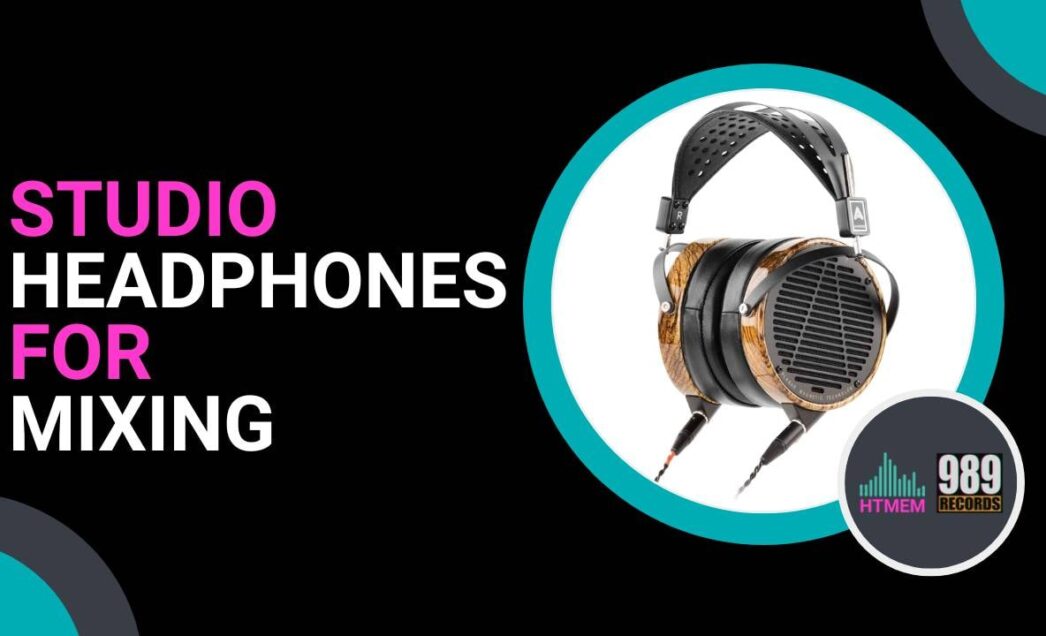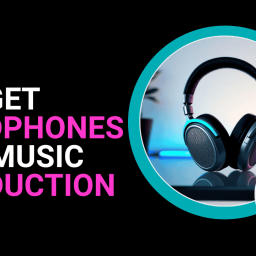Expert Tested: The best mixing headphones are specially designed to accurately reproduce sound with minimal distortion or coloration. This means they provide a more accurate representation of your mix compared to regular consumer headphones or speakers.
A check of your mix into headphones is always suggested before releasing the track or before the mastering stage. This is because headphones aren’t affected by early reflections caused by the sound jumping off the walls from the speakers and coloring what you hear.
Or perhaps because your music creation comes alive at night, and your neighbors aren’t too keen on listening to your tunes at 2 in the morning. 😁
So let’s understand something more
What are Studio Headphones?
Studio headphones stand out for their exceptional sound isolation and accurate audio reproduction, making them ideal for music production tasks like recording, mixing, and mastering.
They offer a flat frequency response, which is essential for reproducing sound as it was originally intended, making them ideal neutral headphones for mixing. However, they may not be the best choice for casual listening or everyday commuting.
Types of Studio Headphones
Closed-back headphones, ideal for recording and tracking, minimize sound leakage, ensuring a clearer audio capture. Conversely, open-back headphones, with their open-earcup design, are favored for mixing and monitoring tasks due to their superior sound quality.
Each type serves a distinct purpose in the production process, enhancing the overall audio experience. Both closed-back and open-back designs can serve as excellent reference headphones, providing the accuracy needed for critical listening tasks.
Key Features to Look for in Studio Headphones
Before making your choice, let’s understand more about the specific qualities and types of mixing headphones you can choose from.
Frequency Response and Range
A good mixing headphone should feature a flat frequency response and an accurate sound signature. A well-reproduced low bass is crucial for evaluating headphones, especially for specific uses like mixing and tracking.
Opt for headphones that cover a frequency range from 20Hz to 20kHz to ensure superior sound quality. Steer clear of headphones with enhanced bass or any frequency imbalances for the best mixing experience.
Comfort and Durability
For prolonged usage, studio headphones must offer comfort. Opt for models featuring ear pads crafted from materials that allow your skin to breathe and headbands that can be adjusted for a perfect fit. For those who use their headphones extensively, selecting a pair designed with durable metal frames and premium plastics is advisable for enduring performance.
Connectivity Options
Studio headphones typically feature a coiled cable, affording ample freedom to move throughout your studio. While some models offer wireless capabilities, wired headphones remain the preferred choice for studio applications.
Impedance and Sensitivity
When it comes to studio headphones, understanding impedance and sensitivity is crucial for achieving optimal sound quality. Impedance refers to the resistance a headphone presents to the audio signal, while sensitivity measures the headphone’s ability to convert electrical signals into sound waves.
- Impedance: Studio headphones typically have an impedance of 32 ohms or higher. This higher impedance allows them to be driven by a variety of audio sources, including professional audio equipment and consumer devices. High-impedance headphones often require more power to deliver high-quality sound, making them ideal for studio environments where powerful amplifiers are available.
- Sensitivity: Sensitivity indicates how efficiently headphones convert electrical signals into sound. A higher sensitivity rating means the headphones can produce louder sound with less power. Studio headphones usually have a sensitivity rating of around 100 dB or higher, ensuring they can deliver clear and detailed audio even at lower power levels.
By considering both impedance and sensitivity, you can choose studio headphones that provide excellent sound quality and compatibility with your audio equipment.
Sound Isolation and Leakage
Sound isolation and leakage are critical factors to consider when selecting studio headphones, especially in a professional setting.
- Sound Isolation: Closed-back headphones are generally superior in sound isolation due to their solid outer shell, which prevents external noise from interfering with your listening experience. This makes them ideal for recording and tracking, where minimizing background noise is essential. However, some open-back headphones also offer good sound isolation, thanks to well-designed earcups that reduce external noise.
- Leakage: Closed-back headphones tend to leak less sound compared to open-back models, making them a better choice for recording and tracking. This ensures that the sound from your headphones doesn’t bleed into the microphone, maintaining the integrity of your recordings. On the other hand, open-back headphones, while more prone to sound leakage, are often preferred for mixing and mastering due to their natural and spacious soundstage.
Choosing the right type of headphones based on sound isolation and leakage can significantly enhance your studio experience, ensuring you achieve the best possible sound quality.
Open-Back vs. Closed-Back Headphones
Open-back headphones offer a broader soundstage, enhancing imaging and the positioning of instruments, which can significantly improve the listening experience. However, they may lack the deep bass that closed-back headphones can offer.
On the other hand, closed-back headphones are superior for recording and tracking purposes due to their ability to prevent sound leakage. It’s important to evaluate your specific mixing and recording requirements carefully when deciding between open-back and closed-back headphones.
Achieving Professional Sound Quality
For professional-grade sound quality, the use of a premium studio headphone is paramount. Opt for models that offer a flat frequency response and a true-to-life sound signature. Steer clear of consumer-grade headphones, which typically feature a V-shaped sound signature and exaggerated bass, to ensure the most accurate audio reproduction.
Tips for Choosing the Best Headphones
Before selecting a pair of studio headphones, carefully evaluate your budget and requirements. It’s also important to compare the audio quality across various listening devices to ensure an accurate assessment of sound. Opt for headphones that offer superior sound isolation and ensure a comfortable fit. It’s advisable to read consumer reviews and listen to audio samples prior to finalizing your purchase.
The Best Studio Headphones for Mixing
Ideal mixing headphones need to exhibit a neutral sound signature alongside an accurate soundstage. Seek-out headphones are characterized by a flat frequency response and superior sound isolation.
Price Range and Budget Considerations
Studio headphones are available at various price points, ranging from economical choices to premium models.Understanding what you need and how much you’re willing to spend can help you make an informed decision.
- Budget: If you’re on a tight budget, consider entry-level studio headphones that offer good sound quality and durability. While they may lack some advanced features, these headphones can still provide excellent value for the price, making them suitable for beginners or hobbyists.
- Mid-range: Mid-range studio headphones strike a balance between sound quality, features, and price. These headphones are suitable for most studio applications, offering a good mix of performance and affordability. They often include features like comfortable ear pads, durable construction, and a flat frequency response.
- High-end: High-end studio headphones offer the best sound quality, features, and durability. These models are designed for professional studio applications, providing exceptional audio fidelity and comfort for long mixing sessions. While they come with a higher price tag, the investment is often justified by their superior performance and longevity.
By considering your budget and specific needs, you can find the best studio headphones that offer the right balance of sound quality and features.
Brand Reputation and Warranty
When investing in studio headphones, it’s essential to consider the brand reputation and warranty to ensure you’re getting a high-quality product.
- Brand Reputation: Look for brands known for producing high-quality studio headphones. Reputable brands like Audio-Technica, Sennheiser, and Beyerdynamic have a long history of delivering reliable and well-regarded products. Choosing a well-known brand can provide peace of mind, knowing that you’re investing in a product with a proven track record.
- Warranty: A comprehensive warranty is crucial for protecting your investment. Look for brands that offer a minimum of a 2-year warranty, covering any potential defects or issues. Some brands may also offer extended warranty options, providing additional coverage and peace of mind.
By considering brand reputation and warranty, you can ensure that your studio headphones are a reliable and long-lasting addition to your audio equipment.
By taking these factors into account, you can choose the best studio headphones for your needs and budget. Whether you’re a professional audio engineer or a hobbyist, the right studio headphones can make a significant difference in your music production workflow.
Audizee LCD-3
In my humble opinion, these headphones set them as the best headphones I’ve ever used.This model features a circumaural design perfect for studio use with a superb bass response. Its open-back design allows for natural sound reproduction and a superior soundstage, with a punchy bass that enhances the overall audio experience. It also boasts a flat frequency response, making it an ideal choice for mixing.
Sennheiser HD 800
The Sennheiser HD 800 is a top choice among professionals for its clear, transparent sound reproduction. The Sennheiser HD 800 is often considered one of the best reference headphones for its clear, transparent sound reproduction. Its open-back design allows for a natural and spacious soundstage, making it ideal for mixing and mastering purposes. The headphones also feature dynamic transducers with powerful neodymium magnets, providing crisp and detailed audio.
Beyerdynamic DT 880 Pro
Another popular choice for studio headphones, the Beyerdynamic DT 880 Pro offers a balanced and analytical sound with excellent mid-range clarity. The semi-open design allows for some ambient noise to seep in but overall provides a well-defined soundstage and accurate frequency response. It’s also advisable to compare the audio quality of your mixes on other headphones to ensure a balanced and professional sound.
Audio-Technica ATH-M50x
The Audio-Technica ATH-M50x is a versatile option that delivers a flat and neutral sound signature, making it ideal for mixing. Its closed-back design also provides good sound isolation, allowing you to focus on your mix without outside distractions. These headphones also offer strong bass response and crisp highs, making them suitable for various music genres. The Audio-Technica ATH-M50x is often regarded as one of the best mixing headphones for its flat and neutral sound signature.
Conclusion
Studio headphones stand as an indispensable tool for music producers and audio engineers. Opting for the ideal set can significantly improve the fidelity of your sound, thereby refining your mixing and recording prowess. In the selection process, it’s critical to focus on key aspects such as frequency response, comfort, and durability to ensure they align with your unique requirements.
Suggested Reading
Finding the Best Budget Audio Interface for Your Studio
Practice adn Enjoy!










